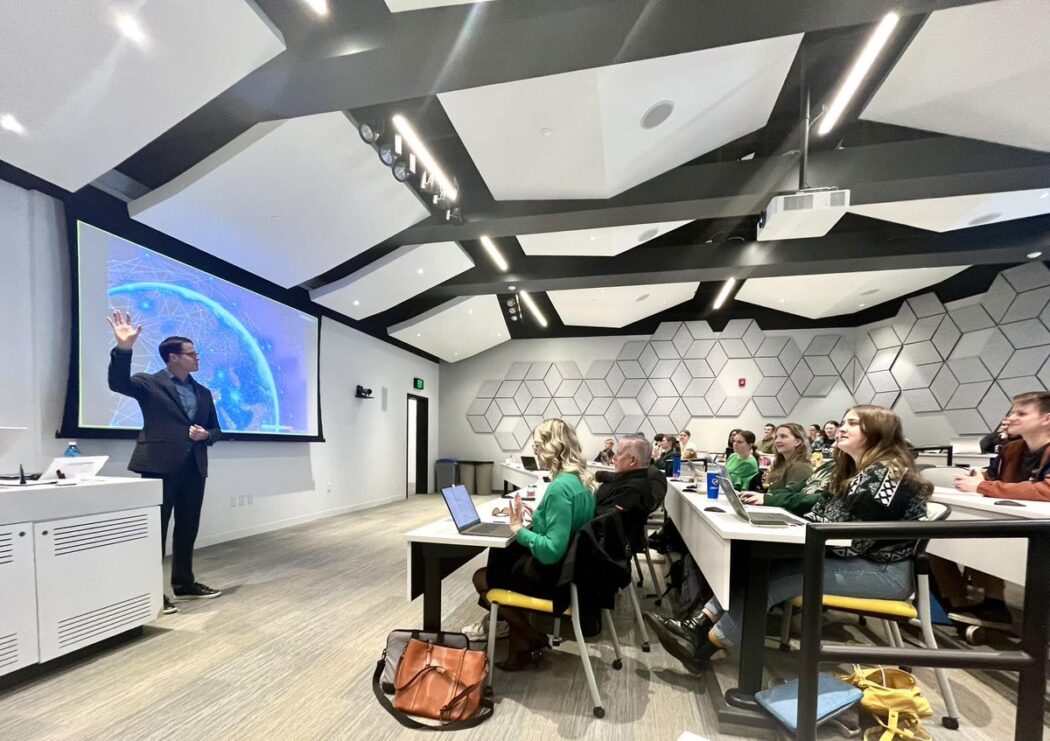New USU master’s program first of its kind nationwide
The Center for Anticipatory Intelligence at Utah State University prepares students to respond to emerging security issues.
According to their website, “Anticipatory Intelligence is a multi-domain approach to anticipating threats and opportunities emerging from the world’s increasingly complex security environment.”
Students can receive an undergraduate minor, graduate major, or master’s degree in anticipatory intelligence through the CAI program at USU.
Jeannie Johnson, founding director of CAI, has been at Utah State for 23 years. Prior to her time at USU, she worked for the CIA.
Johnson said they began creating the program six years ago. They have developed an interdisciplinary system of education for their program.
“The idea was because the problems we face, the challenges we face — specifically the security challenges we face — because they are complex and intertwined, then our education needs to match the problems and right now, as you know, higher education is really siloed and separate,” Johnson said.
Wanting to overcome this separation of education, Johnson recruited partners from various colleges across the university.
“We have partners in engineering, in the school of business, in the school of agriculture, and wonderful — absolutely wonderful — collaborators who came together,” Johnson said.
She said these partners could see the vision of the interdisciplinary idea and the value of this problem solving approach.
In addition to joining forces with partners at USU, the CAI has established various formal agreements with other universities and institutions.
“We have eight formal industry partners, which you can find on our website,” Johnson said. “We work hand in hand with those industry partners to create internships and opportunities and career paths for our students.”
She said CAI has a fantastic placement rate for their students, with students landing in “terrific programs” all across the country.
According to Johnson, having anticipatory intelligence on your resume gives you a platform to talk about a really unusual and desired education during interviews.
She said many of her students reported receiving this education was their key to success.
The master’s of anticipatory intelligence is the first program of its kind in the nation.
“We started with two classes, turned it into a minor, then a graduate certificate, and now a master’s degree,” Johnson said.
The MAI degree was launched this spring, and is structured to be a two-year program, with 33 credits required.
“We have four different emphasis tracks, and those are all housed in and taught by other colleges at this university,” Johnson said.
The four emphases are international security, cyber and security analytics, biosecurity, and GIS natural resources.
There are no requirements to apply for the MAI program other than having completed a bachelor’s degree.
Johnson said they have a wonderful diversity of students who have joined their program, with differing majors.
“What we would like to emphasize is that we welcome, enthusiastically, all majors. I really need all majors — theater arts majors, folklore majors, soil science majors, all majors,” Johnson said.
She also gave a shout out to all women students who might have “self-eliminated from applying because they think this program is tough.”
“It is tough, and they can do it,” Johnson said. “Ladies, step up. You can do this, and we need you.”
She expressed how important female voices are in the industry.
“We need both sides of the gender — all sides of the gender equation — to be involved,” Johnson said.
Johnson said some students might perceive the program to be very tech-oriented, but that is a misunderstanding.
“It isn’t, it’s problem-oriented. So what we are fundamentally concerned with is the well-being of communities,” Johnson said.
Johnson said this misunderstanding means they have attracted STEM students, but she wants students without STEM backgrounds to recognize they are a valuable and an essential part of the program as well.
Johnson said right now, the field of anticipatory intelligence is an aspiration for the intelligence community.
“When we say this is an aspiration of the intelligence community, anyone who is working on thinking ahead about what challenges — specifically security challenges — their company, or their community, or their nation may face, they need to know how to do it, and no one has yet developed how to do this,” Johnson said.
Johnson said their challenge is to continue drawing together the brightest minds to think about how they can do a better job of anticipating future challenges that may threaten the security of communities.
“We need people who are really well versed in relationships, in bridge building, in building strong teams of problem solvers,” Johnson said.
The application window for the MAI program remains open. Johnson invites any students who are interested to apply.
-Kate.Stewart@usu.edu
Photo from CAI website

